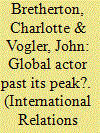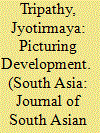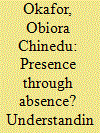| Srl | Item |
| 1 |
ID:
179027


|
|
|
|
|
| Summary/Abstract |
This article argues that the US Navy’s roles (which have historically been bifurcated between warfighting and political use of force) manifest in its organisational culture as two different concepts of war: the US Navy as diplomatic actor and the US Navy as warfighting force. The conflict between these different concepts of war can be seen in the current debate about the definition and function of presence. The debate about presence is not just theoretical, but represents a deep and enduring conflict within the Navy as an organisation about its concept of war. Since the end of WWII, the Navy has been designing its fleet architecture according to a Mahanian concept of war, despite the preponderance of non-lethal missions and activities. The result is a mismatch between platforms and tasks.
|
|
|
|
|
|
|
|
|
|
|
|
|
|
|
|
| 2 |
ID:
127069


|
|
|
|
|
| Publication |
2013.
|
| Summary/Abstract |
Examining a range of policy areas in which the European Union (EU) acts externally - notably trade, development, climate change and foreign and security policy - this article considers the notion that the years since the mid-2000s have witnessed a decline in EU actorness/effectiveness. In evaluating EU performance, the article employs the interrelated concepts of presence, denoting EU status and influence; opportunity, denoting the external context of EU action; and capability, referring to EU policy processes and instruments, with particular reference to the impact of the 2009 Lisbon Treaty. It is contended that achievement of the increased capability envisaged by the Lisbon Treaty, together with resolution of the Eurozone crisis, with its deleterious effect upon the Union's presence, would not fully compensate for the loss of opportunity provided by the changing international structure.
|
|
|
|
|
|
|
|
|
|
|
|
|
|
|
|
| 3 |
ID:
188187


|
|
|
|
|
| Summary/Abstract |
The paper engages with the world of outdoor election campaign materials (posters, banners and billboards) and their ways of establishing developmental truths during India’s general election of 2019. Offering a content analysis as well as their discursive production, the paper seeks to understand how these materials commissioned by the Biju Janata Dal (BJD) and the Bharatiya Janata Party (BJP) are loaded with development metaphors even while differing from each other in the conception and delivery of development. Contrary to the commonly held belief that posters and banners are the prehistory of election campaigning, it is proposed that they are more democratic and participatory, and so a treasure trove of developmental meaning-making. Going beyond the delivery of messages through the textual and pictorial elements of visual materials, it is also proposed that their presence and abundance signify in ways not easily appreciated.
|
|
|
|
|
|
|
|
|
|
|
|
|
|
|
|
| 4 |
ID:
084573


|
|
|
| 5 |
ID:
178006


|
|
|
|
|
| Summary/Abstract |
This study examines the African Human Rights Action Plan (AHRAP) through the lens of Upendra Baxi's germinal theory on the emergence in our time of a ‘trade-related, market-friendly human rights’ (TREMF) thesis that is challenging the specific understandings of ‘people-centric’ human rights that are predicated in the letter and spirit of the Universal Declaration of Human Rights (UDH). Baxi contends, instead, that the dominant strands of the contemporary understandings of human rights are – for the most part – designed to protect the interests of global capital. That said, human rights frameworks in low-income countries need to be studied with a view to what they say and don't say about global capital. Despite its attempt to facilitate a progressive realisation of human rights in Africa, the AHRAP does not rise far enough above the TREMF paradigm to re-locate itself within the UDH one. This is due to the AHRAP not adequately theorising and analysing the role of capital in the (non)realisation of human rights in Africa. By allowing trade and market practices to slip to a significant extent beyond its purview, the AHRAP privileges – to a significant degree – the needs/interests of capital over the human rights of ordinary Africans. That is, the victims of the excesses of capital in Africa are reincarnated in the AHRAP document by the fact of their exclusion from it.
|
|
|
|
|
|
|
|
|
|
|
|
|
|
|
|